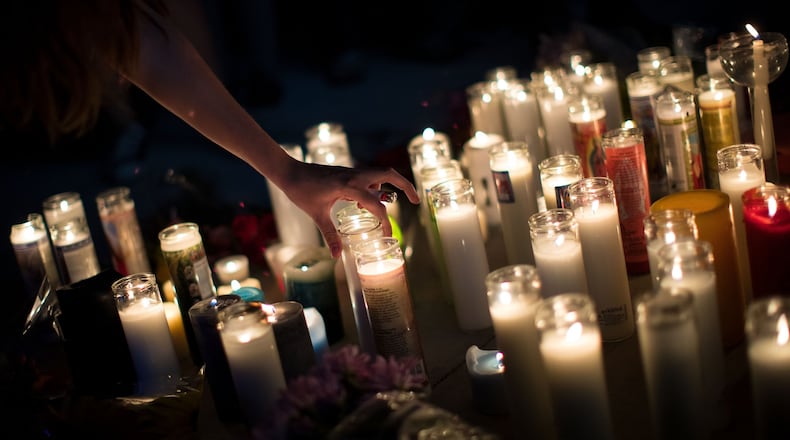The massacre took place almost 2,000 miles away, but people everywhere are reeling from the appalling tragedy.
Nearly 60 people were killed and hundreds more were injured Sunday night when a gunman opened fire on more than 22,000 people gathered near the Mandalay Bay Casino for a country music festival.
Police said the gunman opened fire from the 32nd floor of the Mandalay Bay Hotel on people attending the Route 91 Harvest country music festival. Authorities found him dead in his hotel room, according to the Las Vegas Metropolitan Police Department.
In the aftermath of a mass shooting, it is common for people to experience a vast range of emotions, including shock, fear, anger and sorrow. Dr. J. Kip Matthews, an Athens psychologist, said when people experience these intense emotions, it is not uncommon to begin to have trouble sleeping, concentrating, eating or even remembering things in general.
He said it’s important to remember that these reactions are common and normal and often subside over time. He said reaching out to your support system — your friends and family — and taking special care of yourself can bring comfort and help with coping.
The Rev. Bill Ross, the pastor of the First Baptist Church Marietta, said his office is getting calls from members about the shootings. It's likely to be part of the prayers and services Wednesday and Sunday.
He plans to pray for the families of those killed and people who were injured in the shooting and even those who witnessed the massacre.
“It’s our vulnerability,” he said. “We realize how vulnerable we are and how fragile life is. The question always comes into play, ‘Is pain and suffering greater than good?’ ”
The incident was overwhelming in terms of scope and its impact on people around the world. This is a time to turn to prayer and focus on the good in the world, he said.
“Sometimes … a lot of times … we take that for granted,” Ross said. “No one can really understand the mind of the person who did this, but goodness, beauty and truth outweigh the evil in the world.”
Credit: � 2017 Cox Media Group. � 2017 Cox Media Group. � 2017 Cox Media Group. � 2017 Cox Media Group. � 2017 Cox Media Group. � 2017 Cox Media Group.
Credit: � 2017 Cox Media Group. � 2017 Cox Media Group. � 2017 Cox Media Group. � 2017 Cox Media Group. � 2017 Cox Media Group. � 2017 Cox Media Group.
Bishop Reginald T. Jackson, the presiding prelate of the Sixth Episcopal District of the African Methodist Episcopal Church, echoed that sentiment.
“There are no words to ease the pain or fill the void caused by this tragedy. Instead, we offer our love and compassion,” Jackson said. “We are neither white, black or brown, but brothers and sisters; one nation, caring and encouraging each other. We lift our sisters, brothers and nation in prayer, trusting God to do what only He can do, heal our hearts and ease our pain.”
Whitney Owens, a licensed professional counselor at Savannah at Water's Edge Counseling, said tragedies offer us a time to reflect on our own lives.
“Consider taking a mental inventory of how you spend your time and make sure you are investing in what is important,” she said. “Allow this tragedy to push you forward in making your life have meaning.”
Meanwhile, Matthews recommends the following coping strategies to help get through the coming days and weeks:
Talk about it with others. Turning to the support of loved ones who genuinely care about you and processing your thoughts and feelings with them can be reassuring. Additionally, people may find it helpful to talk with others who have gone through a similar experience. This sharing can normalize one's feelings and reactions to the event.
Turn off the news and take a break. It is vital that people strike just the right balance between staying informed by watching the news while not getting overloaded with too much information and exposure to the discussion. Too much exposure can actually heighten your stress, whereas too little exposure can create uncertainty and doubt. Schedule some breaks where you can engage in some activities that are fun and relaxing.
Avoid negative thinking. People need to become better aware of their inner voice and how it is interpreting these events. Two traps that individuals can fall into is catastrophizing (seeing things much worse than they really are) or black-and-white thinking (e.g., viewing people as either good or bad).
Nurture and take care of yourself. Engaging in activities that help you feel better and to better cope with life's challenges. Eating a healthy, balanced diet and participating in regular physical activity can do wonders for the mind and body. Meditation, yoga and relaxation training can quiet your mind and improve sleep. Try to minimize or avoid use of alcohol as a means of coping.
Talk to your children about what has happened but be sure the conversation is age-appropriate. With a younger child, you will not get into as many details as you would with a teenager. When bringing this up for conversation, find a quiet moment to discuss what happened. Find out what your children already know. Tell the truth (lay out the facts as you understand them, but you do not need to give graphic details). Reassure your children that you will do everything you can do to take care of them and to protect them. And remind them that they can come to you at any time if they have more questions or need to talk.
Keep Reading
The Latest
Featured




